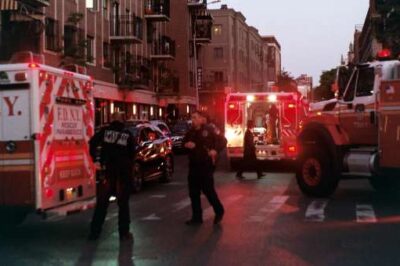From Chapter 1 (“The Accident”) of Penny Maxwell’s Setting Broken Bones
You don’t get many calls like the one I got right after a meeting with our church staff in the living room of our home. At the start of every year, we cast vision, dream together, and imagine what God has next for our church. It’s an invigorating, focusing time that helps launch us into the new year. I was enjoying the afterglow of that while tidying up when a call instantly dispelled all good feelings.
“Colby’s been in an accident,” the caller said, referring to my and my husband, Troy’s son and oldest child. “It was bad—real bad.”
It’s amazing how fast your body and mind can go numb. The warmth of our just-ended staff leadership meeting vanished; in its place was an icy river of doubts and questions: “What kind of an accident? How bad was it? Was Colby injured? Was anyone else injured? Where is my son now?”
“Lord, please let Colby be safe,” I prayed as I backed out of our driveway and sped toward the scene. I was in that zone you find yourself in when the very worst possibilities may become actual. Seconds felt like hours as I guided the car through familiar roads near our home in Charlotte. The cold, sunny day had a hardness to it—an unyielding reality that I couldn’t hide from.
Something had happened to Colby; I was about to face it.
A wall of traffic soon stood before me. A snaky line of brake lights backed up onto the main roads. Nobody was going anywhere. In my mind questions collided: “How am I going to get to him with all this traffic? What will I see when I get there?” I had no qualms about going off road in my urban-mama SUV, knowing that if I got pulled over, I would at least gain a police escort. Onto the shoulder I steered the car, bumping past hundreds of waiting vehicles. Then the shoulder ran out.
Even though I was dressed in business clothes and high heels—it hadn’t occurred to me to waste time grabbing a coat or changing my shoes before I went out the door—I couldn’t just sit in my car and wait. I didn’t hesitate one second but parked on a convenient side road, jumped out, yanked my high heels off, and started half jogging in my bare feet on the asphalt. An open lane stood before me, where oncoming traffic would have been. To my right was the endless line of people having a normal day as they headed home. I was the one in crisis now, tracing the path that would take me to see whether my son was still alive. It was the longest mile of my life.
Walking barefoot for what seemed like a separate lifetime brought me within sight of the grim destination. Cars had flipped upside down; some clearly would never be salvaged except for parts. Ambulances and fire trucks sat zigzag, harsh lights strobing the scene. I recognized that one of the upside-down cars belonged to Colby. Around it a veil of broken glass shimmered from the ground.
“God, I beg You for mercy,” my heart cried. I strained my eyes to find our son, hoping he was alive.
Meanwhile Troy was on his way with an off-duty policeman in our city who had recognized our car at the center of an accident on a notoriously curvy road about eight miles from our house. As I stepped nearer, I could see stretchers on the ground. My eyes darted to each one. Colby’s form wasn’t on any of them.
“Is he on the ground somewhere with a cloth over him? Or is he still in his car after all this time?” I didn’t have to wonder long. As I picked my way through the scene, suddenly I spotted him. He was standing on the embankment. My mother’s heart seemed to burst as I rushed over to him.
“Are you OK?” I asked, grabbing hold of him carefully. I could see he had bruises by the way he was holding himself. “Yeah, I’m fine,” he said in typical seventeen-year-old-male fashion. “I crawled out through the broken windshield. Those airbags hurt.”
A police officer came up to talk with me. He had been interviewing people.
“Ma’am,” he said, “this right here is called Dead Man’s Curve. We don’t have accidents here where the coroner doesn’t come. This is a first for us. It’s a miracle that everybody is walking away from this with their lives.”
As with everything at that moment, I took in his words mostly without expression of outward emotion. Then he and Colby stepped aside for an interview about what had happened. I stood on that knoll alone, watching the evolving scene. Crews were cleaning up glass. Some victims had been loaded into ambulances. The worst was over.
That’s when the Lord spoke to me specifically and clearly.
“Do you trust Me?” He said.
Gratitude practically poured from my soul in response.
“Lord, You know I trust You. You just saved my son’s life. This could have been so different,” I said inwardly.
“That’s not what I’m asking you,” He replied. “Do you trust Me?”
Now He was meddling, and I protested a bit, “Lord, he shouldn’t have walked away from this. Of course I trust You.”
But He wasn’t done. “If it hadn’t worked out the way it did, and you weren’t taking your son home with you, would you still trust Me?” He pressed in His gentle but unyielding way.
Now I grew perturbed.
“Why in the world are we having this conversation now?” I fumed at the Lord. I’ve never been afraid to express my true emotions to Him. There I stood, watching the cleanup process of an accident that could have—should have, according to the officer—taken my son’s life. “Can’t You see I’m a little traumatized?” I continued. “I almost lost my son.”
“Because I need to hear your answer before you come off this hill, or every single day when one of your children leaves the house, you will look out the window and wonder if they are coming back,” He said to my heart. “If you don’t trust Me and crucify your fear at this moment, that fear will be present all the time. You will replay this over and over.”
I was still miffed that He was dealing with me so firmly in such a sensitive moment. Yet I knew His timing, like His love, was perfect. So I listened.
“I am a good God not because Colby is walking away from this,” He continued. “I am a good God because I am faithful. Faithful doesn’t always look like getting the answer you like. I was in the midst of this. I was in the car, and I am in every situation, even when it’s painful and difficult.”
This was all true, but I wasn’t going to answer quickly or untruthfully. I needed to sit with this one for a moment. I still had two younger kids who didn’t have their driver’s licenses yet—they were both home when I dashed out the door. Like any mom, the two main things I worried about—pardon me, prayed about—were that I would never do anything to mess up my kids and that they would suffer no harm in instances like this. The first one I had some control over; the second one I didn’t. Would I affirm that I trusted a good God whatever future outcomes might be? Or would my trust be situational and outcome based?
I wanted to say yes to the first question, but I didn’t want to verbalize it. It felt like sitting in an emergency row on an airplane when the steward asks, “Are you willing to assist in an emergency?” Just nodding your head doesn’t count. They tell you, “I need a verbal yes.” I was nodding my head to God, but I felt as if He was saying, “That’s not enough. I need a verbal yes.”
So I said it.
“Yes, God. I trust You. I will give You full rein in my heart. I give You everything. I promise that even if I weren’t walking away with my son alive, my faith is in You alone.”
This was nonnegotiable. I was giving Him full access to my heart, risking great pain. But I had made my choice. {eoa}







Leave a Comment
You must be logged in to post a comment.